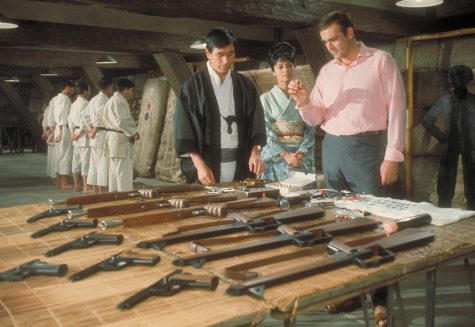From appropriation to representation
How Hollywood has shaped Asian Americans, and how Asian Americans will shape Hollywood
June 15, 2021
For decades, Hollywood has produced films that provoke, entertain and inspire through a blend of dramatic, visual and musical artistry. The portrayal of Asian Americans, on the other hand, has been far less glamorous.
“[I grew up] in an era where [Asians were] casted through racially stereotyped avatars. In the films I have seen, and even TV shows, Caucasian actors would play any variety of roles… but you would only see Asian characters playing comic book extremes,” said English and film teacher James Desmond.
Even a film as socially conscious as Spike Lee’s 1989 masterpiece “Do the Right Thing,” which was celebrated for its portrayal and condemnation of racial inequalities in America, was subject to a stereotyped misrepresentation of Asian Americans.
“There is a scene [that is deliberately] ignorant and [serves as] a tension builder in which various characters from different ethnicities speak directly to the camera and.. [embodies] stereotypes. The groups [portrayed] include Italians, African Americans and, of course, a [conflation] of different Asian nationalities. [Though] I know what the film’s intentions are… I’m kind of uncomfortable with these portrayals… particularly [of the] Asian grocers, who speak pigeon English. It’s not necessarily an enlightened portrayal and I feel like it’s not even necessary for them to speak in extremely broken English. If they remade this today, [I suspect] that there would be a difference in their portrayal, even if it’s a mild one,” said Desmond.
While Hollywood films are a source of pure escapism for many, their societal influences are very real.
“Over time, if the Asian guy is only the sidekick or only the delivery boy or a masked ninja, and that’s the only way we represent Asian guys, how do you think that’s going to affect the psychology of the audiences over time? They will only think that that person is as valuable as a side character,” said actor and Commack alumnus Eddie Liu ‘05.
In March, a gunman opened fire at multiple massage parlors in Atlanta, killing eight Asian American women. With the shooter’s defense pointing to his alleged “sex addition” and his desire to “eliminate” these sources of “temptation” as the primary motivating factor behind this heinous crime, one cannot help but wonder whether the shooter’s twisted perception could be linked to the traditional portrayal of Asian American women in Hollywood.
“Asian women are portrayed as mysterious and enchanting and there’s almost this undercurrent of evil [that surrounds them]. [Oftentimes], Asian women are used as a seductress to get someone to let their guard down. In an indirect way, they communicate to the audience that [these negative qualities] are what these people have to offer,” said Desmond.
In addition to the perpetuation of negative Asian stereotypes, Hollywood also has an ugly history casting white actors in Asian roles.
“My first experience of this was watching Sean Connery go undercover in a James Bond film. He was supposed to be playing a Japanese character and so convincingly as to be able to fool villains as a double agent. Even as a child it seemed kind of ridiculous,” said Desmond

While Hollywood has moved on from such overtly racist portrayals, the issue of conflating distinct ethnicities still persists.
“Ben Kingsley has played probably about 5 different ethnicities in films. Actors, whether it gets spoken or not, almost get labeled as ethnic looking and then their ability to manipulate voice and do accents. He’s played an Iranian before, a Jewish gangster, and even Gandhi. He’s one of those chameleon actors who can convincingly pull off many roles. [His portrayals fall] into more of a grayer area than someone like John Wayne, Mickey Rooney or Sean Connery playing an Asian,” said Desmond.
In recent years, the representation of Asian Americans on the big and small screen have been on the rise. Eddie Liu’s latest project, CW’s Kung Fu, is the first network drama to feature a predominantly Asian cast.

“[In “Kung Fu”], we are reclaiming the portrayal of Asians. [These characters] are no longer here to just fulfill a stereotype and leave the scene, [they] are now fully fleshed out three dimensional characters with rich background and deep relationships with each other. When you get past the typical tropes and give [characters] a rich backstory, that’s when you break stereotypes,” said Liu.
For more on Liu’s story see an in-depth Q&A here
Asians have also received recognition on the biggest stage in the cinema world. 2021 marks the second year in a row that an Asian director has received an Academy Award for Best Director at the Oscars, with Chloe Zhao winning the award for her work on “Nomadland.” Last year’s winner was Bong-Joon Ho, who won the award for the film “Parasite.”
“What’s important about this too is that it’s an Asian filmmaker with a [non-Asian] cast and a pretty much strictly Asian cast and filmmaker. We’re seeing two different perspectives from one year to the next,” said Desmond.
The implications of these wins go beyond receiving a golden statuette.
“Hollywood is forced, whether they want to or not, to follow a formula that has shown some success. After ‘Pulp Fiction’ won best picture in 1994, this nonlinear disjointed 12 character story film formula, which was never imitated as successfully, rose to prominence,” said Desmond
While the hope is that studios will be more open to incorporating different people within their films, they should not be complacent with merely aiming for diversity in their films.
“If you aim for diversity, you will reach tokenism. It would be like checking the boxes for one [female], one Asian, one gay and one black person and [saying] that this is sufficient enough for diverse storytelling. That is how you get things like stereotypes because people will be like ‘ok, I had one Asian person say a line. Is that enough for you people?’ No it’s not, because we have to keep more seats open at the table,” said Liu.
While the presence of different people from different backgrounds is a start, allowing them to tell their own stories through film and television is what will cause genuine change within the industry.
“Representation is probably the most powerful tool, and it’s embarrassing that we’re only [starting to focus on] this now. If we’re just hearing white voices tell the stories and [influence] the narratives [of others] with these ugly stereotypes, we haven’t fully evolved. The only way to affect change authentically is to hear from different voices,” said Desmond. 🔳



